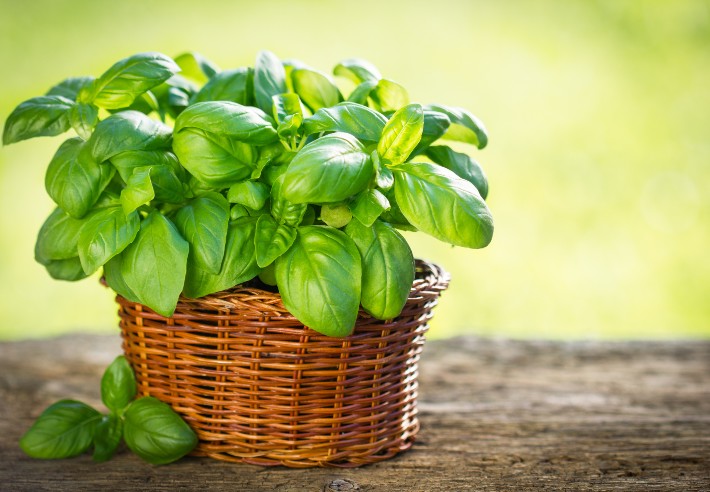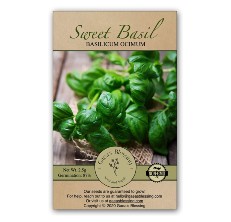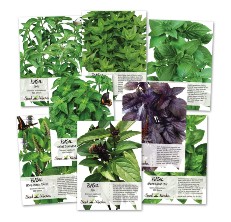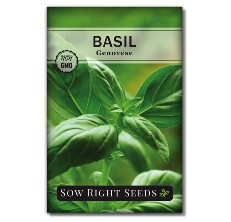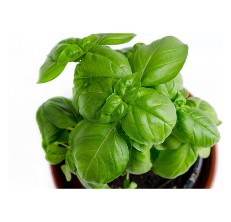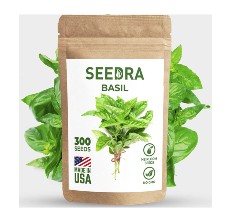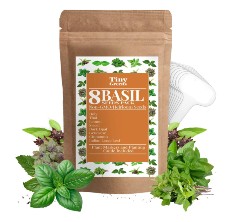- Flowers & PlantsVegetablesOur content is meticulously curated through independent research, testing, reviews, and AI-driven recommendations, all designed to present you with the finest product choices. When you make a purchase through our links, it could result in us earning a commission.
The Best Basil Seeds of 2024
Last updated: Apr 23, 2024
.
The herb basil is native to India and Southeast Asia; it's treated as an annual plant in temperate climates, but it can have a shorter, seasonal lifespan in tropical climates. There are over 60 basil types, each of which has its unique flavor and bouquet. Basil plants love the sun, and the best way to cultivate healthy basil seeds is to let them have 7 to 8 hours underneath bright lights every day. If you want to start growing basil, a high-quality seed is the best place to start. We've compiled a list of the best basil seeds out there to make your basil-buying decision easier. The best overall basil seed goes to Gaea's Blessing Sweet Basil Seeds for its high yield, 87% germination rate, seed amount per pack, and absence of GMOs.
Our Top Picks For Basil Seeds
- Best Basil Seed Overall: Gaea's Blessing Sweet Basil Seeds Shop Now ➔
- Most Basil Types: SeedNeed Basil Seed Packet Collection Shop Now ➔
- Most Seeds Per Packet: Sow Right Genovese Basil Seed Shop Now ➔
- Best for Indoor Planting: RDR Seeds Genovese Basil Seeds Shop Now ➔
- Fast Germination: SEEDRA Basil Seeds Shop Now ➔
- Great Basil Variety: Tiny Green 8 Basil Herb Seed Pack Shop Now ➔
View all ContentsThe Best Basil Seeds
Best Basil Seed Overall
Gardening may look like an expensive hobby to some at first, but you’ll quickly realize that it’s actually really cheap to get started with, especially if you know how to shop on a budget. This pack of 1500 basil seeds from Gaea is extremely affordable, with a single 670mg pack of 1500+ seeds costing $4.99 per packet.
Gaea is also giving some discounts when buying the seeds in bulk, saving you even more money if you plan on growing a lot of basil. The basil itself is Italian sweet basil, so if you prefer this type of basil, then this is the product for you.
Most Basil Types
Even if you may love basil right now, there’s always the possibility of you getting bored of eating or ingesting it in the future. It’s just how we humans function. Luckily for you, there are many ways to keep one interested in basil – one of the most common ways being the planting of different types of basil.
This packet collection from SeedNeed contains eight different types of basil, each distinct from one another, so you’ll never get bored with them. SeedNeed promises this will also make your garden look a little more interesting, with all the different types of basil growing about.
Most Seeds Per Packet
Many of you reading this right now are likely to have some experience with gardening. But what if you’re a novice who wants to garden and are a little overwhelmed with the intricacies of the hobby? This seed packet from Sow Right is perfect for beginners, as not only are the seeds easy to plant, but they also come with an instruction guide that shows exactly how you should go about planting your basil. Sow Right says it’s a great first step into indoor and outdoor gardening.
Best for Indoor Planting
Indoor gardening is becoming more of a common practice these days. Check out the RDR Basil Seeds to get started. This packet of basil seeds is perfect for the indoor gardener – the seeds are ideal for containers, which makes them perfect for apartment owners and dorm residents alike. RDR says these will spruce up any indoor garden while adding a fun flavor to pizzas, salads, and pestos.
Fast Germination
One of the biggest concerns of many people these days is GMO plants and food. Many prefer to grow the crops themselves rather than risk digesting chemicals through market produce. These basil seeds from SEEDRA are safe to eat though.
Fortunately, many basil seeds are GMO-free so you don’t have to worry about eating any sort of GMO foods when you grow your own. This pack of basil seeds germinates in about five to ten days, so expect to see the little fellas sprouting at around that timeframe.
Great Basil Variety
This Tiny Green seed pack is like the previous one and contains eight different basil seeds. What really sells this pack, though, is its high germination rate. They boast 95% rates, which makes it extremely likely that your seeds will pull through and grow to become sprouts, and then fully grown basil plants. Tiny Green says they are non-GMO too, so you can expect only the best basil leaves growing from your plants.
The Best Basil Seed Buying Guide
Basil seeds are easy to plant, germinate quickly, and are edible, making them one of the best beginner plants to practice with. However, you can’t just grow the ideal basil plants through skill and practice alone. Some basil variants are better than others, and you may want something specific out of what you’re growing. Here’s a brief guide on how to pick the best basil seeds for you to purchase.
What is a Basil Seed?
A basil seed refers to the seed of the basil plant. Basil seeds are small and hard to spot in soil, and can even be eaten on their own, making it a somewhat popular addition to smoothies and the like. Basil seeds are often sold in packets of hundreds of seeds to maximize the chances of germination.
Why do you need Basil Seed?
Here’s why you’d want to buy basil seeds.
To grow basil
Many people buy basil seeds for one reason, and one reason only – to grow basil. Whether it be in small pots beside your room’s window, or in a small patch by your backyard, basil is great for both urban and rural spaces and can be eaten once it’s fully grown. The fact that basil can also be used as both a food and medicine makes it all the more special for individuals living alone or families with mouths to feed.
To eat them
You don’t even need to wait for the plants to grow to enjoy basil. Basil seeds are perfectly edible on their own, and if you’ve ever tried healthy smoothies in restaurants before, there’s a chance that basil was used in the recipe. Basil seeds are commonly found in smoothies as they’re easy to ingest with them, but you can also enjoy them in other ways – you can even eat them raw if you fancy that.
As a hobby
Gardening has always been a hobby for homeowners for decades, and it’s still a fairly popular pastime. Not only is it rewarding to literally see the fruits of your labor, but it also provides a good source of oxygen in your household, which is vital in this day and age. You also get to save a bit on money if you’re growing plants that you can make food from, which is always a plus.
Things to consider when buying Basil Seed
Here’s what you need to remember when getting basil seeds.
Variety
Variety is one of the key features of basil, and it’s what you first want to consider when getting them. Depending on what you want to use the basil seeds for, some varieties may be better than others, hence the importance of deciding the type of basil seed immediately. We can classify the seeds based on their likely uses – as an ingredient, as medicine, or as edible seeds.
Basil is used in many recipes such as pesto. Varieties such as Genovese basil are made for these purposes. While you can use other types of basil, Genovese is probably one of the better choices out there. This is a great example of why you should worry about variety more than anything else. If you already have a purpose in mind, it’ll be much easier to narrow down your search, making the buying process much simpler.
Germination rate
Another important factor any home gardener should consider is the germination rate. Germination rate refers to the rate at which a seed germinates and grows into a plant. The rate isn’t 100% for most plants, as there are some that are just bound to not grow, but many basil seeds sold these days have more than 80% germination rate, so more likely than not, they’ll grow.
That isn’t to say, however, that germination rate doesn’t matter. In fact, while some seeds offer an 80% germination rate, others boast as high as 95%. This can be important if you want to grow your seeds as soon as possible and want to maximize the possibility of your first batch of seeds growing. If you’re taking your time, though, pretty much any seed packet will do, so long as the germination rate is good enough.
Space
Even if this isn’t directly related to the basil seeds that you’re buying, you should definitely consider where you plan on planting your seeds. After all, not everybody owns a yard that they can plant their seeds in. Some live in smaller homes, while others live in apartments and have to use pots instead to grow their own plants and food.
Luckily, there are many different types of seed packets available to cater to just about anybody. Some packets are good for a few potted plants, making them ideal for indoor planting. Others come in larger packs, which are more ideal for outdoor gardens. Be sure to check the package to see how many plants you can expect to grow from the seeds so you can plan ahead accordingly.
If you’re pressed for space, you may want to consider the height of where you’re placing your plant, too. Basil plants are relatively short, but they do grow up to 24 inches in height. Two feet may not sound like a lot, but if you’re living in a small apartment where every inch of space matters, it may be too much. There are some basil varieties that grow a bit shorter, so you may want to consider looking for those instead if you don’t have that much room for two feet.
Environment
A good environment is vital if you want your plant to grow. Basil plants usually thrive in warm weather, so it’s best not to plant them when winter’s starting to come in. And even though they do love warm weather, you probably shouldn’t let it bake over a hot summer sun. If the temperature’s a little too hot, providing it some shade will keep it in good condition.
Another thing worth pointing out is that plants such as basil love moist soil. It has to have enough moisture to absorb at all times. Note that this does not mean you should keep the soil wet and drenched – too much water would be bad for the plant. Instead, keeping the soil mildly damp whenever possible is the better option. Your plant will grow more healthily and happily with the right amount of moisture found in the soil.
Basil Seed price range
Basil seeds are very cheap, and you can use them both as an ingredient for food or as planting seeds for your garden. Packets can cost $5 or more each, with around 500 to 600mg worth of seeds. The variety of the seed can affect the seeds’ price, though not as much as the brand of the seller itself.
How we choose the best Best Basil Seed
We choose our basil seeds based on their germination rate, variety, price, and customer reviews.
Basil Seed FAQ
What is basil good for?
Basil is an herb that’s commonly used for many health problems, most commonly those relating to the stomach. Basil can also be used as an ingredient for food.
Is it safe to eat basil every day?
There isn’t any concrete evidence to prove otherwise, but it’s generally not recommended to eat basil every day, especially in the long term.
Article Contributors
Read More About Garden Gate Review Team HereThe Garden Gate Review Team’s product reviews and in-depth guides are here to help you choose the best products for a beautiful and bountiful garden and backyard. The content is created by The Garden Gate Review Team. Garden Gate’s editorial staff is not involved. Garden Gate is reader-supported: When you buy through links on our site, we may earn an affiliate commission. The Garden Gate Review Team is composed of authors, editors, and gardeners. Artificial Intelligence (large language models) may have been used in the research and creation of the content.
Please reach out to aimperiapt@gmail.com with any questions regarding product testing or specific articles.
